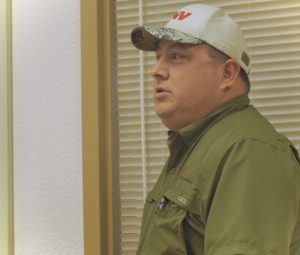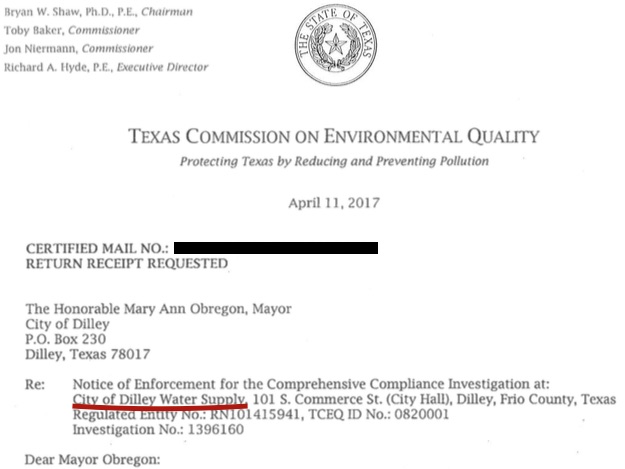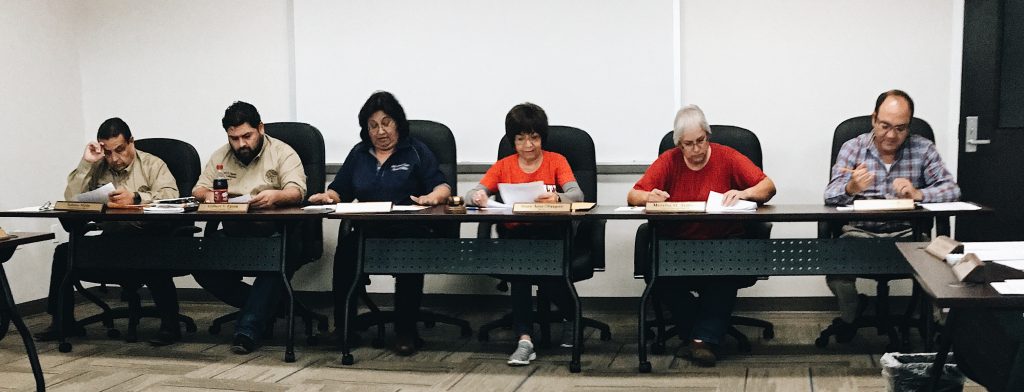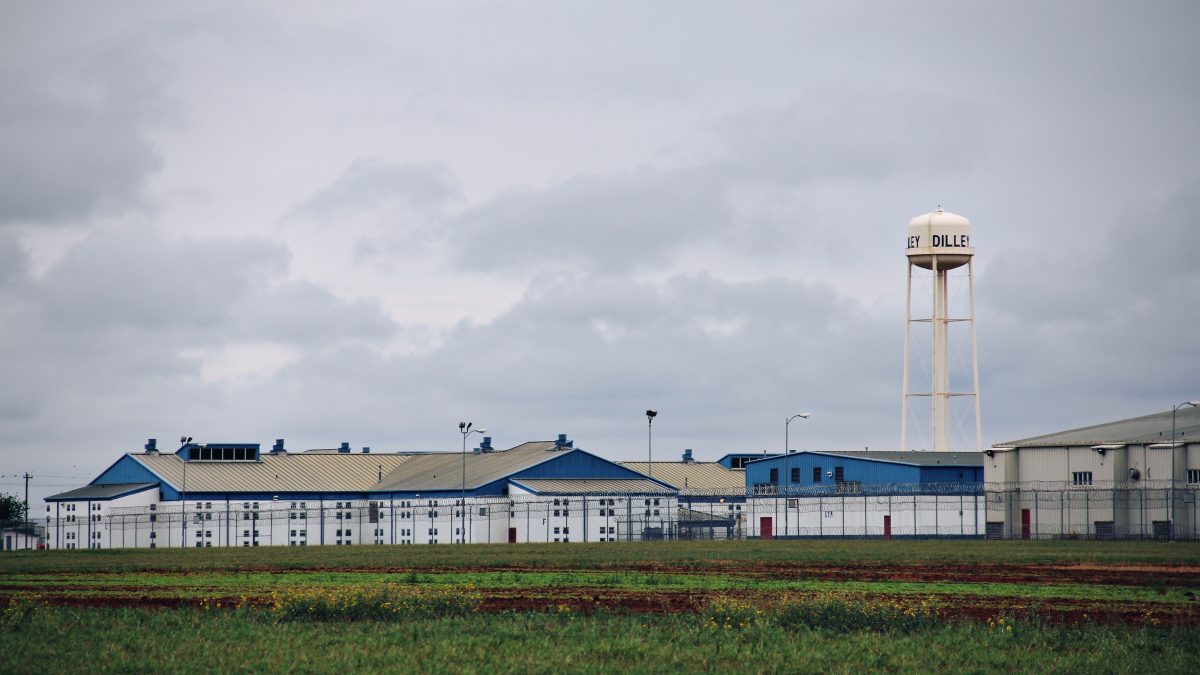Based on the counsel of a city attorney currently under disciplinary sanction by the State Bar of Texas, and the engineering company that oversaw the $4 million city hall/convention center project, the city of Dilley voted to take steps toward a new $7 million wastewater treatment plant exclusively for the Dolph Briscoe prison. It will be funded through certificates of obligation, and will nearly double Dilley’s current certificates of obligation debt.
If you cynically believed Dilley’s city council would not discuss infrastructure issues publicly at the October 30th meeting…
… you were right.

Previously unreleased documents, however, chronicle the events that led to the city’s new $7 million prison wastewater treatment plant proposal, and what it means for you…
A PROBLEM BUBBLES TO THE SURFACE
Dilley’s water and wastewater infrastructure serves approximately 2,600 residential customers, 1,300 offenders at the Dolph Briscoe State Prison, and up to 2,400 detainee immigrant mothers and children at CoreCivic’s South Texas Family Residential Center.
On March 8, 2016, Rick Garcia of LNV Inc tried to get Dilley’s city council ahead of a potential problem with the Texas Commission of Environmental Quality. For two years, TCEQ had sent various notices to the city via certified mail, detailing several violations in the city’s water and wastewater infrastructure that had to be addressed. Of particular concern were monthly overages of “permitted effluent limits” at the self-contained prison wastewater treatment plant. E. coli and “total suspended solids” in particular- as much as ten times the legal limit in one case.

Additionally, Garcia explained that prison sewer limits had been exceeding capacity. Permitted at 300,000 gallons per day, Garcia explained the prison system was handling over 400,000 gallons per day.
The proposed solution was to install a “force main” and necessary infrastructure to divert some of the sewage from the prison wastewater treatment plant into the city’s wastewater system, which could handle the additional load.
“It’s strongly recommended by Robert Viera [an LNV engineer] that we move forward with this,” Garcia said. The goal was a proactive approach to avoid TCEQ fines.
The city council approved the plan, as did TCEQ. In the approval letter from TCEQ to LNV Inc, one paragraph was bolded for emphasis- a reminder about keeping wastewater facility permits current:

Everything was moving smoothly along, the way taxpayers expect a city to function. Over the next few months, LNV Inc received seven bids for the sewage diversion project. On June 21, 2016 the city voted to award Wauters Engineering the WWTP Force Main Diversion Project for $176,046 as recommended by LNV.
And then… nothing…
NEWS OF TCEQ VIOLATIONS BURSTS
One year after Rick Garcia addressed the Dilley city council, this blog published an April 12th 2017 report about an enforcement action from the Texas Commission of Environment Quality regarding the prison wastewater treatment plant violations from 2015. When problems are uncovered by an investigation, TCEQ first sends a notice of violation. The responsible party is given time to correct the violation. When TCEQ discovers that the violation has not been corrected, the notice is elevated to an enforcement action. The city of Dilley received eight repeat notices of violations at the prison wastewater plant throughout 2016 before TCEQ decided to pursue enforcement action in February 2017.

And out of 6 enforcement actions currently pending in all of Frio County that cover government agencies, businesses, and individuals… 3 are currently levied against the city of Dilley.
The April 12th article also speculated about the environmental violations’ impact on the city’s water supply, as the prison wastewater treatment plant is located next to city water facilities, including a water well and storage tank. With the mayor and two city council seats up for election two and a half weeks after the article was published, Dilley Mayor Mary Ann Obregon uncharacteristically addressed public chatter in a newspaper ad.
The e. coli violations were a result of nothing more than ducks doing “their business wherever they are,” the mayor’s ad read. Furthermore, she explained that the city’s water was filtered, chlorinated, and “taken seriously.”
Not mentioned in the Mayor’s ad: nine days prior, TCEQ sent a new notice of violation, separate from the prison wastewater plant enforcement. The new notice was for the public water supply. “Failure to maintain watertight conditions,” “failure to maintain facilities,” “failure to protect the gravity filters from atmospheric contamination, “failure to maintain sanitary easements,” and on and on. 17 items in all, some violations dating back to 2014.

Particularly troubling in the notice were “failure to make adequate records available for review,” and “no Revised Total Coliform Rule Sample Siting Plan.”
"Coliform bacteria are organisms that are present in the environment and in the feces of all warm-blooded animals and humans. Coliform bacteria will not likely cause illness. However, their presence in drinking water indicates that disease-causing organisms (pathogens) could be in the water system." - United States Dept. of Health
If these types of contaminants were present in potentially harmful amounts in the city’s water supply in years prior, it would be nearly impossible to prove or disprove with a simple records request.

 Fine print from the same 2014 drinking water quality report, referring to “follow-up or routine tap M/R”
Fine print from the same 2014 drinking water quality report, referring to “follow-up or routine tap M/R”
Despite the public show of confidence in the Mayor’s campaign ad, behind the scenes, the city hurried to dust off the year-old WWTP Force Main Diversion Project. On April 17th, 2017, emails exchanged between Noel Perez, then Dilley city administrator, Hector Castaneda of LNV Inc, and TCEQ.
“The council wants closure on this,” Perez wrote to Castaneda of LNV Inc. “Will you please provide engineered plans (bidding) on item presented for consideration?”
The same day, Castaneda emailed TCEQ. “The City has already bid out a diversion project back in June 2016 but there has been some hold up due to easements with the Prison. The low bid was about $174,000. Please let me know how we can approach this since the fine is a lot less.”
Initially, TCEQ was ready to accept Dilley’s project proposal to satisfy the prison wastewater plant enforcement action.
During the summer of 2017, however, Dilley’s plans would begin to crumble…
THE REAL SH&T SHOW
Carlos Martinez made national headlines in February 2016, around the same time Rick Garcia of LNV Inc first presented the WWTP Force Main Diversion Project to the city council. Martinez was Crystal City’s water superintendent when black water started flowing from their taps. He told CNN that TCEQ declared the water safe to drink. TCEQ denied this.
Martinez was hired one month later by the 2016 Dilley city council by unanimous vote.
Part of his duty as Dilley’s water/wastewater operator was to renew the permit for Dilley’s city wastewater and water treatment plants. Martinez didn’t notice the permits were expiring until two days before the deadline. The permits lapsed on May 1st, 2017 and continued to operate “without authorization.” The renewal for the water treatment plant is still in progress today.
Here’s the problem with the expired permits: the city’s plan was to divert the prison wastewater to the city facility. Since the city facility was now unpermitted, TCEQ could no longer approve the diversion project, and the prison wastewater enforcement action would remain in effect.
“Thank you for your application,” a TCEQ rep emailed the city. “Because the permit for regulated entity WQ0010404003 expired, we cannot develop the SEP [Supplemental Environmental Project] as written.”
In June, the public water supply notice of violation was also elevated to an enforcement action. The city now had two separate TCEQ enforcement actions, one for the prison wastewater treatment plant and one for the city water supply.
In August, a reported sewage spill estimated at over 15,000 gallons occurred at the prison wastewater facility. The smell carried far enough to catch the attention of some employees at CoreCivic’s neighboring South Texas Family Residential Center. Soon after, Carlos Martinez resigned, according to the city.
In September, TCEQ notified the city of Dilley that the expired city water and wastewater facility permits were added to the enforcement action fines.
October… October offered a glimmer of hope for the city of Dilley. The water rate schedule expired, presenting the city an opportunity to set new rates to offset the cost of a solution to the TCEQ enforcement actions…
CITY COUNCIL GOES SILENT

The two freshmen councilmen, Sabino Mena and Gilbert Eguia, fought for public transparency at the top of the October 30, 2017 Dilley city council meeting.
Immediately after the meeting opened, the Mayor started to ask for a motion to move into private session, but councilman Eguia jumped in.
“Mayor, I was going to ask if it would be possible to move executive session after items 4, 5, and 6?” Eguia asked, attempting to discuss the public items first in front of the nearly nine Dilley residents that showed up to the meeting.
Before the last words of Eguia’s question left his mouth, the Mayor responded. “No. Because we have people that traveled. We have to let them go home.” The only people in the meeting who traveled were city attorney Bobby Maldonado, who receives $1200 per city council meeting he attends, and Robert Viera of LNV. The paid consultants were given preferential treatment over Dilley residents.
Councilman Mena expressed concern that the order of agenda items was “putting the cart before the horse.” City administrator Rudy Alvarez argued that the information received in closed session would inform the council’s decision-making for the public items.
Despite the back and forth, Eguia and Mena were outnumbered, and the meeting moved into executive session. As the private session dragged on, many members of the public left. And when the council reconvened, there was no discussion on the open items. In a possible violation of the open meetings act, all of the agenda items, including the scheduled open items, were apparently fully discussed in executive session.

It was a stunning rebuke of transparency. The open session was over in five minutes and the public was no more informed when they left when than when they arrived.
Councilman Mena, who voted against each of the items, stormed out of city hall into the nighttime parking lot. “An 8 million dollar loan for a new wastewater treatment plant! I don’t understand how these people keep getting voted in…” His voice trailed off as he marched to his car.
The estimate turned out to be closer to $7.3 millon dollars and would nearly double the city’s current certificates of obligation debt. The $7.3 million dollars was among the details that went unmentioned in the public portion of the city council meeting.
But a picture was coming into focus. The majority of the team that botched a simple $174,000 repair for over a year, that told the public the problem was no more than ducks, was suddenly asking for $7 million dollars to build a new state-of-the-art wastewater treatment plant exclusively for the prison…
WHAT JUST HAPPENED?
Three days after the meeting, city administrator Rudy Alvarez wished to clear some things up. After hearing resident concerns that water rates were going up, Alvarez sought to set the record straight.
Sometime in the past few months, it was decided that the $174,000 repair that had been initially approved by LNV Inc and the city of Dilley and TCEQ was no longer viable. A new $7 million dollar prison wastewater plant is the best solution, according to information provided to Alvarez.
Diverting 200,000 gallons of prison wastewater per day would not help, Alvarez said. The prison is permitted for 300,000 gallons but runs from 400,000 to 500,000 and sometimes peaks at 600,000 gallons per day.
Yet, there seems to be a misunderstanding among city reps about what is causing the prison wastewater overages- an assumption that a recent increase in prisoner population is the primary cause. However, records from the Texas Department of Justice show that the population at Dolph Briscoe has remained virtually unchanged at least since 2010.
This misinformation makes the $7.3 million dollar wastewater plant a proposal to address a symptom without understanding the root cause.

No, the Texas Department of Criminal Justice cannot pay for their own wastewater plant- according to Dilley’s city attorney. Roberto “Bobby” Maldonado, currently under disciplinary sanction by the State Bar of Texas on a “fully probated suspension” for the second time in his career, advised that the city is liable for the utility infrastructure for the prison, and agrees with the solution to build the $7 million plant, and recoup the loan debt from prison water/wastewater rates. And…
…Yes, city attorney Bobby Maldonado will probably also double as Dilley’s bond counsel on the $7 million dollar certificates of obligation, according to Rudy Alvarez and will earn a fee on top of the estimated $125,000 he will make from the city of Dilley this fiscal year.
Yes, LNV Inc will design and oversee construction on this project and no, there will not be a bid for their services. The contractor who will actually build the plant will be up for bid.
Yes, the city’s water/wastewater rate schedule is expired.
Yes, the city hired Capex Consulting at $25,000 to perform a new water rate study. But, it was decided that Capex Consulting would only evaluate the prison’s water/wastewater rates, not residential. If all goes as planned, the prison water/wastewater revenue will fund the loan repayment to build the new $7 million dollar facility.
Currently, the prison pays a per gallon rate lower than commercial and residential rates. Capex Consulting is the same company that recommended Dilley’s current water rates.
According to Alvarez, residential water rates will be addressed at some point next year.
No, the prison water rate study job will not be up for bid and no other companies besides Capex Consulting were considered.
Lastly, the city has only voted to agree start the process of taking out the loans. In about a month, the city council will have to vote to approve an ordinance issuing the certificates of obligation to actually finalize this deal…
RECORD NUMBER OF PRISON CLOSURES
As the city council considers an $7 million dollar investment in the Dolph Briscoe State Prison in Dilley’s backyard, the Texas Department of Criminal Justice was ordered by state lawmakers to close four prison facilities in 2017.
That’s a single year record of prison closures for the State of Texas, and makes eight closures in the past six years.
According to Dallas Morning News, “closings are possible because of a combination of factors, including falling crime rates and legislative efforts to reduce the number of people who spend time behind bars.”
Republican chairman of the House Corrections Committee, James White, said, “if we can keep the economy growing, if we can make sure we’re giving people at least adequate-type educational opportunities, there’s no reason why we can’t continue this trend…”
–written by Jose Asuncion.
Jose received an MFA from University of Southern California in 2008, a BA from the University of Illinois at Chicago in 2003, and currently lives in Dilley, TX, home of his grandparents.


